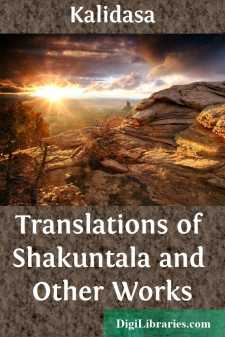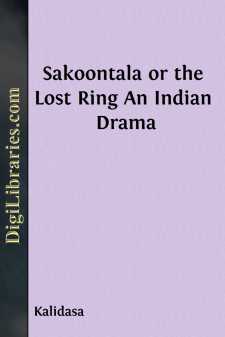Categories
- Antiques & Collectibles 13
- Architecture 36
- Art 48
- Bibles 22
- Biography & Autobiography 813
- Body, Mind & Spirit 142
- Business & Economics 28
- Children's Books 17
- Children's Fiction 14
- Computers 4
- Cooking 94
- Crafts & Hobbies 4
- Drama 346
- Education 46
- Family & Relationships 57
- Fiction 11829
- Games 19
- Gardening 17
- Health & Fitness 34
- History 1377
- House & Home 1
- Humor 147
- Juvenile Fiction 1873
- Juvenile Nonfiction 202
- Language Arts & Disciplines 88
- Law 16
- Literary Collections 686
- Literary Criticism 179
- Mathematics 13
- Medical 41
- Music 40
- Nature 179
- Non-Classifiable 1768
- Performing Arts 7
- Periodicals 1453
- Philosophy 64
- Photography 2
- Poetry 896
- Political Science 203
- Psychology 42
- Reference 154
- Religion 513
- Science 126
- Self-Help 84
- Social Science 81
- Sports & Recreation 34
- Study Aids 3
- Technology & Engineering 59
- Transportation 23
- Travel 463
- True Crime 29
Kalidasa
Kalidasa was a classical Sanskrit writer, widely regarded as one of the greatest poets and playwrights in ancient India. His works are known for their lyrical beauty and deep connection to nature and human emotions. Some of his most famous writings include the play "Shakuntala," the epic poem "Raghuvamsha," and the lyrical poem "Meghaduta." Kalidasa's mastery of language and poetic expression has made him a revered figure in Indian literature, with his influence enduring across centuries.
Author's Books:
Sort by:
by:
Kalidasa
KALIDASA—HIS LIFE AND WRITINGS I Kalidasa probably lived in the fifth century of the Christian era. This date, approximate as it is, must yet be given with considerable hesitation, and is by no means certain. No truly biographical data are preserved about the author, who nevertheless enjoyed a great popularity during his life, and whom the Hindus have ever regarded as the greatest of Sanskrit poets....
more...
by:
Kalidasa
INTRODUCTION About a century has elapsed since the great English Orientalist, Sir William Jones, astonished the learned world by the discovery of a Sanskrit Dramatic Literature. He has himself given us the history of this discovery. It appears that, on his arrival in Bengal, he was very solicitous to procure access to certain books called Nátaks, of which he had read in one of the 'Lettres...
more...



